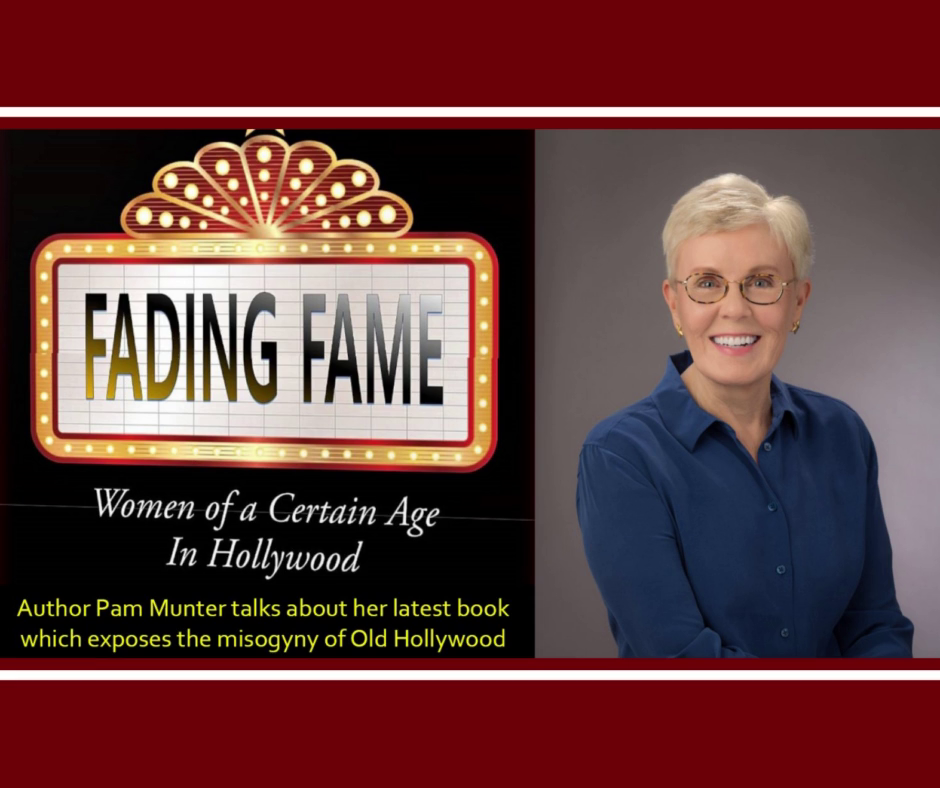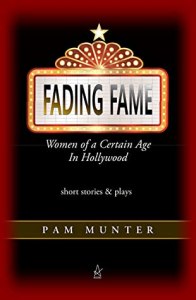Fading Fame: Women of a Certain Age in Hollywood by Pam Munter
Fading Fame: Women of a Certain Age in Hollywood is a collection of ten short stories and two short plays about the troubled lives and subsequent choices made by strong and talented women who survived #MeToo, but have aged out of the profession they love. Each copes in a different way, some better than others, some not at all.
:
:
Extract
Frances
The irony didn’t escape Frances Marion that, although she was the premier screenwriter of her
time, she couldn’t find the right words to describe how she felt about Mary Pickford. Or why.
It didn’t seem like that many years ago. World War I was raging but Hollywood was thriving, existing in a glittering cocoon. Frances had come to the editing room at Biograph and found Mary alone. She was startled when Mary turned around, her petite frame dominated by her big blue eyes and long, curly blonde hair. “I know we’re going to be best friends,” Mary had said within minutes of their meeting. “I don’t have many friends,” she had confided. “No time.”
Frances knew it had to be more than that. Mary was an international icon, untouchable, unreachable some would say. The most powerful woman in the industry. That was more likely the issue. “I would like to be your friend,” Frances echoed, carefully. An unfamiliar jolt came and went from within, like a blast of hot air. It wasn’t at all unpleasant but surprised her with its intensity. Then again, she had never met a movie star before.
Now some 15 years later, Frances looked forward to seeing Mary again, even though she was unsure what she would find in that house tonight. There was a time when there was no ambivalence or anxiety about her dinners at Pickfair. They were fun, lively events full of lawn games, alcohol and opium. She found it odd that Hollywood’s highest paid stars would find it hilarious to shoot home movies of each other, each trying to outdo the other with outrageousness. It was about making each other laugh and it wasn’t hard to do. Someone would always be thrown into the huge pool in their evening clothes or go down the giant slide backwards.
That night, she had invited Bill, her fourth husband, to go with her. It had been a halfhearted gesture on her part.
“It’ll just be another night of drinking,” he said, his face stern.
“Since when has that bothered you?” She gestured to the wet bar that dominated the east wall of their spacious, well-appointed Hancock Park living room. So much unfinished business between them. All those times Bill would disappear into the night, returning a day or two later without explanation or apology. In spite of her best efforts, she had married another alcoholic. How had this happened again?
“You know what I mean. This whole town is drowning in booze.”
He was right. Prohibition hadn’t affected the community at all. And now that it was
gone, the use of all chemicals, illegal and legal, ramped up right on schedule.
“You’re not worried about driving in Beverly Hills, huh?”
“No. The studio is taking care of the ticket. They always do.” She could trust the power of MGM’s publicity honcho Howard Strickling to handle any difficulties with the law, no matter how severe. Even director Busby Berkeley’s running down that poor, elderly woman on the sidewalk was finessed by the studio without any publicity. Frances wasn’t worried about her own intake, anyway. That wasn’t her poison. In fact, she would confront her much more forbidden addiction that very night.
“Why did she invite you, anyway? It’s been years since you heard from her.”
Frances knew that very well. She had missed her friend and dared to hope for a deeper connection, though so many years had passed. “I don’t know. Maybe it was by mistake. But
I’m going.”
Bill returned to his magazine.
“What will you do while I’m gone?” she asked even though she knew his response would be a lie. His latest girlfriend was probably waiting down the block, watching for
Frances to leave.
“Oh, I dunno. Probably just listen to the radio and look through magazines. I might go to bed early.”
Looking over at his stooped frame, she wondered why she had married Bill after knowing him such a short time. He wasn’t smart, their sex was a cruel joke and the more she thought about it, she didn’t like him much personally, either. There must be a reason she had gone through four husbands, each impotent in his own way – perverse, inept, clumsy or drunk. She wasn’t sure what it was but now and again, inklings of other possibilities caused her too much discomfort to pursue the thoughts any further.
It had been at least a decade since Frances had been invited to Pickfair, the iconic Beverly Hills home of silent movie stars Mary Pickford and Douglas Fairbanks. There hadn’t been a falling out, not really, but the distance between Frances and Mary seemed to grow imperceptibly over the years. Hollywood itself had gone through cataclysmic transitions. Just five years ago, silent movies had abruptly given way to the talkies. Major studios had morphed into rapacious whales, gobbling up the smaller fish. Even Mary’s United Artists had experienced pressure from the biggies. And poor little Mary. She was a casualty, too. She had quit the movies. Or did they quit her? Frances’ screenwriting career had taken off and she was now the highest paid in the business, male or female.
Frances eased herself into her newly waxed, burgundy Auburn Phaeton convertible. It had taken most of her screenwriter’s salary from “The Champ” to pay for it. For her, the car wasn’t just a Hollywood status symbol, but a reflection of her conspicuous success in the industry. It made her feel almost invincible. She turned the key in the ignition and the roar of the engine revved her thoughts back to that first day, the morning she met Mary so many years earlier.
Frances was looking for a job as an artist, hoping to create portraits of Mary for movie posters. Instead, she was surprised and a little thrilled at how quickly their friendship had happened. They were almost combustible together—thoughts, ideas, shared experiences sparking the air almost from the start.
Frances drove down the darkened and nearly deserted Sunset Boulevard toward Pickfair, keeping an eye out for any motorcycle cops who might be watching for her car. For just an instant, she thought about returning home and ambushing Bill but thought better of it.
It might be fun, she mused, but she really didn’t care. This marriage, like the last, would be over soon. She would divorce him and move on, as she always did.
As she checked her lipstick in the mirror, she realized that it had been so long since they’d been in touch that Mary didn’t know about the last two husbands. Well, Mary knew about the first one because they’d talked about their love lives over drinks one night at the Sunset Inn. The drinks just kept coming that night and before she knew it, Mary had told Frances about her hardscrabble childhood on the road while playing burlesque houses, something she never confessed to anyone. How she had been fondled and even raped by older men on the circuit. Maybe it was the highballs or perhaps being moved by the trust, but it made Frances cry. Mary got up from the table and walked around to comfort her, caressing her back ever so gently. When they stood up to leave, the long, tight hug elicited that same, now familiar tsunami, etched in her emotional memory bank and nurtured all these years. She was afraid to want more, wondering what it all meant. Still, after that evening, Frances was more careful about the extent of her alcohol intake around Mary.
The last time she saw Mary, she was still “America’s Sweetheart,” with her screen swashbuckler husband Douglas Fairbanks, ceremoniously placing their hands and feet in cement at Grauman’s Chinese Theater. Flashbulbs popping and fans screaming, everyone wanting to touch Mary. Could that be five years ago already? Because of the size of the crowd
and the reporters, Frances couldn’t find a way to maneuver herself close to Mary. Even gossip maven Louella Parsons had trouble getting a quick interview for her radio show with the world-famous stars. After a while, Frances gave it up, settling for an enthusiastic wave to
Mary from across the expansive forecourt.
Thank you, Pam Munter and Coriolis Company
:
About the author
Pam Munter is a retired clinical psychologist, former performer, and film historian and has earned herself six higher-education degrees. Her many lengthy retrospectives on the lives of often forgotten Hollywood performers and others have appeared in Classic Images and Films of the Golden Age. More recently, her essays and short stories have been published in more than 150 publications, such as The Matador Review, Literary Yard, Sad Girl Review, The Rumpus, Remington Review, The Willow Literary Magazine, as well as many others. Munter has authored several books, including When Teens Were Keen: Freddie Stewart and The Teen Agers of Monogram (Nicholas Lawrence Press, 2005) and Almost Famous: In and Out of Show Biz (Westgate Press, 1986). Her memoir, As Alone As I Want To Be, was published by Adelaide Books in 2018. Her play Life Without was nominated four times by the Desert Theatre League, including the Bill Groves Award for Outstanding Original Writing and Outstanding Play (staged reading). She’s a Pushcart nominee, has an MFA in Creative Writing and Writing for the Performing Arts, and lives in Palm Desert, California.

